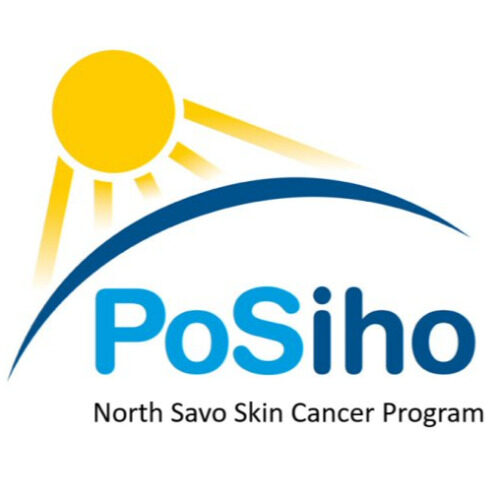
The Immune System in Skin Cancers
Leaders
Group description
Melanoma and non-melanoma skin cancers (basal cell carcinoma and squamous cell carcinoma) have been increasing in population in an epidemic fashion during the last 4 decades, and these cancer types cause a significant burden to the health care system. Ultraviolet radiation from the sun is the essential factor in skin carcinogenesis through induction of immunosuppression and DNA damage.
The immune system and peritumoral stroma can play an essential role in the growth and invasion of cancers. The role of the immune system is emphasized in organ transplant recipients that have a highly increased risk for skin cancers due to effective immunosuppressive treatment. Increased number of cells of the immune system is a typical feature of a variety of skin cancer types. However, their proinflammatory or immunosuppressive function in tumorigenesis is not sufficiently known.
The research project, constituting a part of the North-Savo Skin Cancer Program (NoSCaP), is aimed at enhancing secondary prevention of skin cancers through identification of patients at increased risk for skin cancers. An especial focus of the project is to identify the immunomarkers that can predict skin cancer development. In order to achieve this goal, NoSCaP will be using skin cancer material collected at Kuopio University Hospital in 2000-2013 and subsequently transferred to the Biobank of Eastern Finland. In addition, a follow-up project of patients at increased risk for skin cancers has been initiated. Skin biopsies and blood samples collected from these patients at the first visit at the dermatological policlinic will be analyzed for a variety of immunomarkers.
Keywords
Publications
10 items-
Mast Cells Are a Marked Source for Complement C3 Products That Associate with Increased CD11b-Positive Cells in Keratinocyte Skin Carcinomas
Rahkola, Dina; Laitala, Joel; Siiskonen, Hanna; Pelkonen, Jukka; Harvima, Ilkka T, 2019, Cancer investigation, 37, 2, 73-84. A1 Journal article (refereed), original research -
Mast cell chymase degrades fibrinogen and fibrin
Lipitsä, T; Siiskonen, H; Naukkarinen, A; Harvima, IT, 2019, British journal of dermatology, 181, 2, 296-303. A1 Journal article (refereed), original research -
Mast cell-neural interactions contribute to pain and itch
Gupta, Kalpna; Harvima, Ilkka T, 2018, Immunological reviews, 282, 1, 168-187. A2 Review article, Literature review, Systematic review -
CD40 Ligand Is Increased in Mast Cells in Psoriasis and Actinic Keratosis but Less So in Epithelial Skin Carcinomas
Haimakainen S, Kaukinen AP, Suttle M-M, Pelkonen J, Harvima IT, 2017, Cancer investigation, 35, 3, 143-151. A1 Journal article (refereed), original research -
Low numbers of tryptase+ and chymase+ mast cells associated with reduced survival and advanced tumor stage in melanoma
Siiskonen Hanna, Poukka Mari, Bykachev Andrey, Tyynelä-Korhonen Kristiina, Sironen Reijo, Pasonen-Seppänen Sanna, Harvima Ilkka T, 2015, Melanoma research, [epub ahead of print 27 July 2015]. A1 Journal article (refereed), original research -
Molecular targets on mast cells and basophils for novel therapies
Harvima Ilkka T, Levi-Schaffer Francesca, Draber Petr, Friedman Sheli, Polakovicova Iva, Gibbs Bernhard F, Blank Ulrich, Nilsson Gunnar, Maurer Marcus, 2014, Journal of allergy and clinical immunology, 134, 3, 530-544. A2 Review article, Literature review, Systematic review -
Anti-apoptotic bfl-1 is the major effector in activation-induced human mast cell survival
Ekoff M, Lyberg K, Krajewska M, Arvidsson M, Rak S, Reed JC, Harvima I, Nilsson G, 2012, PLoS ONE, 7, 6, e39117; 1-7. A1 Journal article (refereed), original research -
Cervical squamous carcinoma cells are resistant to the combined action of tumor necrosis factor-alpha and histamine whereas normal keratinocytes undergo cytolysis
Diaconu N-C, Rummukainen J, Mättö M, Naukkarinen A, Harvima RJ, Pelkonen J, Harvima IT, 2008, Bmc cancer, 8, [15, art. 46]. A1 Journal article (refereed), original research -
Mast cell CD30 ligand is upregulated in cutaneus inflammation and mediates degranulation-independent chemokine secretion
Fischer M, Harvima IT, Carvalho RFS, Möller C, Naukkarinen A, Enblad G, Nilsson G, 2006, Journal of clinical investigation, 116, 10, 2748-2756. A1 Journal article (refereed), original research
